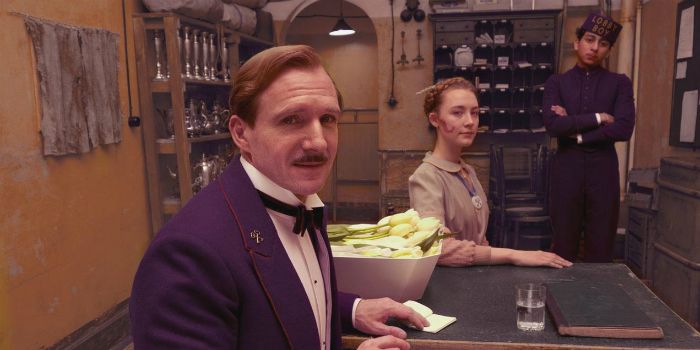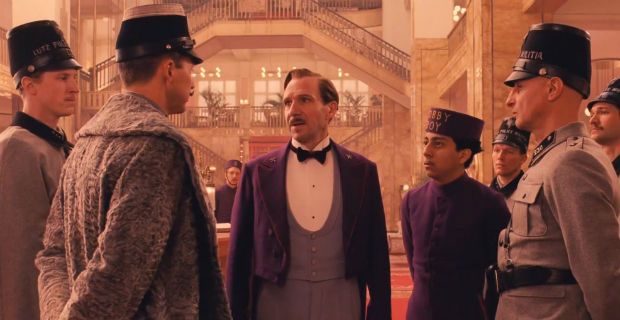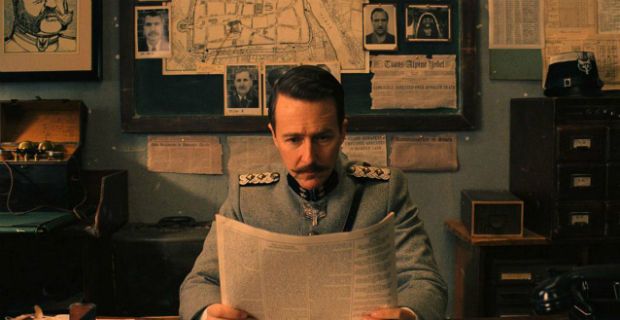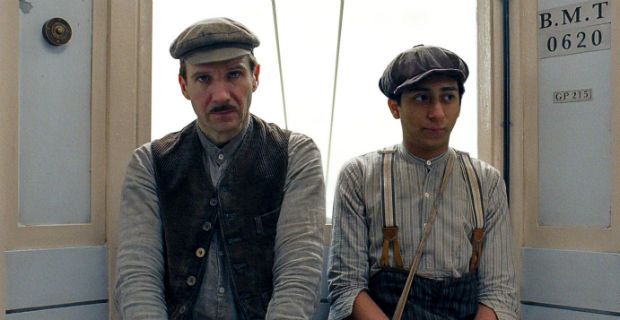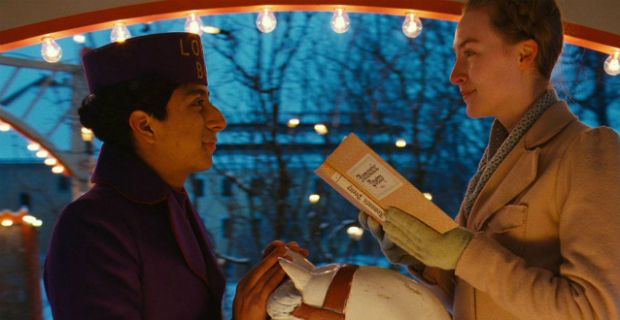Having the Wes Anderson meter cranked up to 10 in Grand Budapest Hotel makes the movie a wondrous celebration of everything that the filmmaker stands for and holds dear to his heart.
The Grand Budapest Hotel takes place in a fictional European alpine state known as the Republic of Zubrowka. In the year 1932, the country is on the verge of war and young Zero Moustafa (Tony Revolori) is working as a lobby boy at the eponymous hotel - a luxurious estate run by M. Gustave H (Ralph Fiennes), a fastidious yet charming and extremely proper man, who spends his days keeping (intimate) company with the hotel's richest, oldest, and blondest guests.
When the elder Madame D (Tilda Swinton) - whom Gustave had been a close companion to for nearly two decades - dies, Zero and his boss find themselves at the center of a storm that involves Madame D's money-grubbing relatives, a priceless painting, and false accusations that Gustave is responsible for the death of the late Madame, which land the Grand Budapest Hotel's esteemed concierge in prison. Zero, with help from the bakery girl Agatha (Saoirse Ronan) who's stolen his heart, seeks to break Gustave out of jail and assist his eccentric friend in proving his innocence.
Let's get one thing straight: Grand Budapest Hotel can be best summarized as the most (for lack of a better term) Wes Anderson-y film that either Wes Anderson - or anyone, for that matter - has made to date; those who found his previous movies like The Royal Tenenbaums, Fantastic Mr. Fox and Moonrise Kingdom ill-fitting to their tastes need not bother to even consider applying, in other words.
However, Anderson-ites - and those who've grown to appreciate his craft over the years - may find Grand Budapest Hotel to be a delightful cinematic confection, which blends traditional European madcap caper elements with Anderson's customary technical finesse to positive effect. Stylistically, Anderson does very little to reinvent the wheel, but he makes up for it by fully embracing his youthful spirit (which has begun to define his work more and more in recent years) and delivering a charming story with a strong humanist core - giving rise to an entertainingly irreverent, yet subtly poignant film that still feels as personal as every other Anderson feature to date.
Anderson's script - from a story co-credited to British illustrator/writer Hugo Guinness (who's collaborated with the filmmaker before) - takes it cues from the literature of famous early 20th century Austrian writer Stefan Zweig. True to that inspiration, Grand Budapest Hotel is a fictionalized, yet insightful, parable for the rise of fascism in Europe in the 1930s (paving the way for WWII) and the resulting decline in cultural/social values. The narrative is very loosely structured (to a fault, perhaps), even as it playfully ribs scholarly tradition and yet sincerely reflects Anderson's well-established French New Wave influence (e.g. the film professes the pleasure of self-expression and beauty in existence over indifference to culture and feeling) - all tinged with a lining of melancholy that comes with age and experience.
Grand Budapest Hotel is likewise distinctly "Anderson-ian" from a technical standpoint - which is both good and bad, in this case. The director's signature heavily-detailed production design, symmetrical composition, and nostalgic quirkiness (example: the use of stylized miniatures/models) offers a feast of pleasant colors and imagery for the eyes, with many a nod to classic cinema peppered throughout. However, there are times when the finely-controlled camera movements and framing arguably feels too constricting; that visual precision sometimes clashes with the jubilant tone and giddy action unfolding onscreen (as well as Alexandre Desplat's equally buoyant score).
Past Anderson films have featured a fair amount of voiceover narration, but none have included quite so much - combined with densely-packed (and self-satirizing) intellectual dialogue - as Grand Budapest Hotel. Fortunately, the director's accomplished cast easily handle the challenges presented by the script. Many of the sideline players here (Willem Dafoe, Harvey Keitel, Jeff Goldblum, and Adrien Brody are very much the tip of that iceberg) have acted in Anderson's world of cinema before, so they know all too well how to have fun dressing up and being cartoonishly deadpan - the way everyone plays when inside one of the director's imaginative dollhouses.
Leading the charge is Ralph Fiennes, in a role that he performs with contagious zest and tangible joy. Fiennes and the much younger Tony Revolori - who holds his own against his experienced costar - play characters who feel like they can be read as dual-halves of Anderson's brain; Fiennes as Gustave is whimsy and old-school properness bottled, yet he sometime cannot resist crudely dropping an S-bomb or F-bomb (to very funny effect), while Revolori as Zero is wide-eyed, yet understandably insecure and of a boyish mindset. The pair's friendship is all the more entertaining for it - and more than a bit touching, in its own peculiar way.
Standouts among the Grand Budapest Hotel's supporting cast include Saoirse Ronan as the book-loving, delicacy-baking Agatha; few people who see this movie are bound to find her personality any less endearing that young Zero does in the film. Meanwhile, the list of great character actors who show up throughout runs astoundingly long - Bill Murray (of course), Tom Wilkinson, Jude Law, Jason Schwartzman, Bob Balaban, Edward Norton, and F. Murray Abraham among them. Nonetheless, there isn't a single piece to this elaborate puzzle that feels as though it's been put in the wrong place.
All in all, having the Wes Anderson meter cranked up to 10 in Grand Budapest Hotel makes the movie a wondrous celebration of everything that the filmmaker stands for and holds dear to his heart - even though that same allowance for artistic self-indulgence is the reason why the film doesn't achieve modern-classic status... and makes it far, far away from being a universally recommendable title. Still, if watching Wes Anderson and his friends get down with their bad selves sounds good to you, then you should definitely check-in to the best hotel in Zubrowka.
In case you're still undecided, here is the trailer for The Grand Budapest Hotel:
__________________________________________________
The Grand Budapest Hotel is now playing in limited theatrical release. It is 100 minutes long and Rated R for language, some sexual context and violence.

